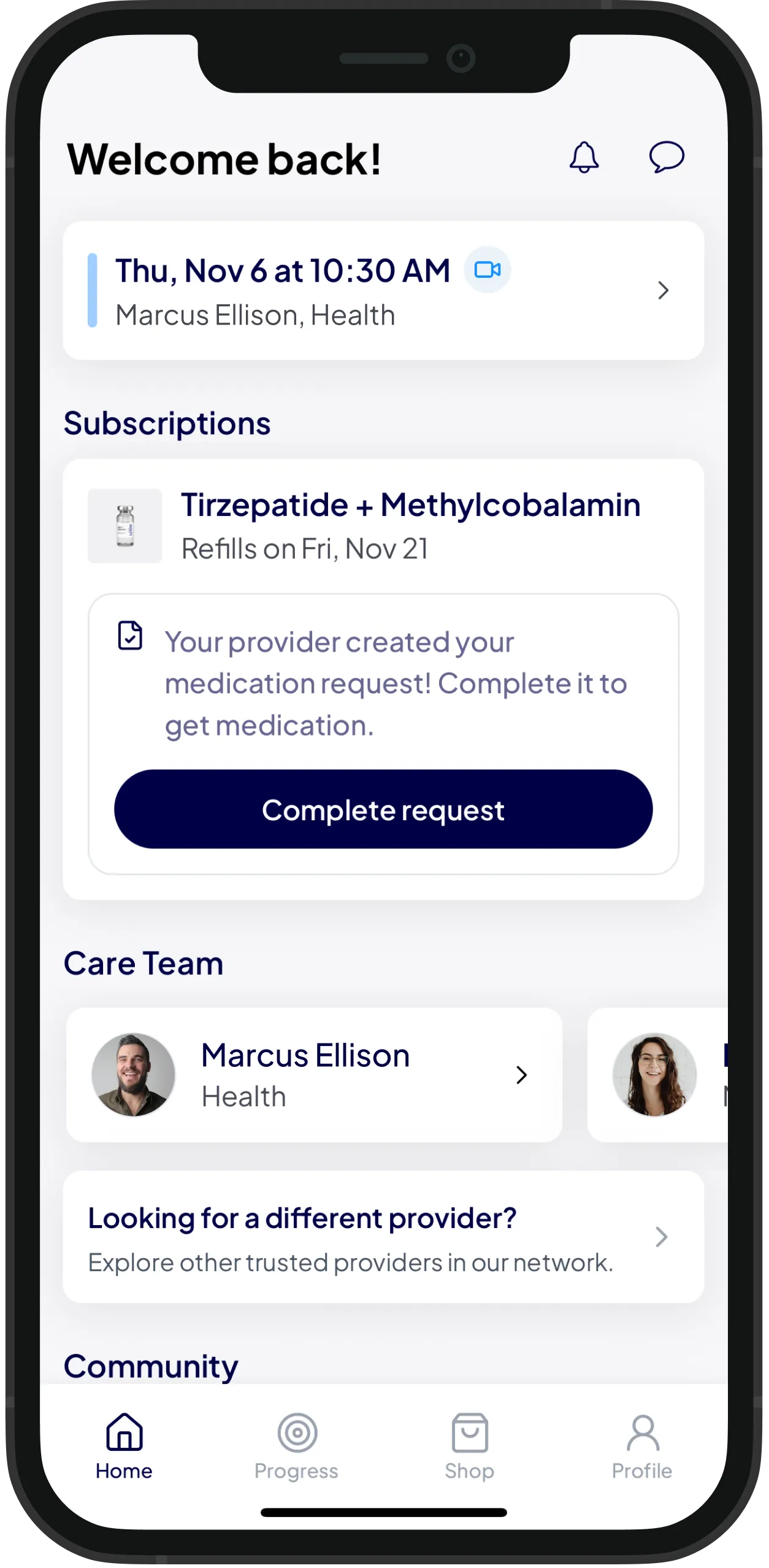Ready to transform your health?
Unlock access to expert guidance and a weight care plan crafted just for you.
Ready to transform your health?
Unlock access to expert guidance and a weight care plan crafted just for you.
Branded medication
Branded medication
Branded medication
Updated on
Updated on
Updated on
Mar 18, 2025
Mar 18, 2025
Mar 18, 2025
Who Should Not Take Ozempic® | Ozempic® Eligibility For Weight Loss
Who Should Not Take Ozempic® | Ozempic® Eligibility For Weight Loss
Who Should Not Take Ozempic® | Ozempic® Eligibility For Weight Loss
Learn who should not take Ozempic®. Our guide covers essential precautions and health considerations for users with specific conditions. Find out whether you would benefit from the medication and what risks to consider.
Learn who should not take Ozempic®. Our guide covers essential precautions and health considerations for users with specific conditions. Find out whether you would benefit from the medication and what risks to consider.
Learn who should not take Ozempic®. Our guide covers essential precautions and health considerations for users with specific conditions. Find out whether you would benefit from the medication and what risks to consider.



Table of Contents
Table of Contents
Table of Contents
Ozempic® Explained: How It Works For Weight Loss
Health Conditions That May Conflict with Ozempic
Evaluating Risks: Side Effects and Concerns
Seeking Alternatives: Options Beyond Ozempic
Who Is A Good Candidate for Ozempic
Find The Best Option For You With Mochi Health
Ozempic® Explained: How It Works For Weight Loss
Health Conditions That May Conflict with Ozempic
Evaluating Risks: Side Effects and Concerns
Seeking Alternatives: Options Beyond Ozempic
Who Is A Good Candidate for Ozempic
Find The Best Option For You With Mochi Health
Ozempic® Explained: How It Works For Weight Loss
Health Conditions That May Conflict with Ozempic
Evaluating Risks: Side Effects and Concerns
Seeking Alternatives: Options Beyond Ozempic
Who Is A Good Candidate for Ozempic
Find The Best Option For You With Mochi Health
In the evolving landscape of obesity medicine, medications like Ozempic® represent a significant advancement in offering new hope for individuals struggling with weight management (1). Yet, as with any medication, Ozempic® is not a one-size-fits-all solution. Understanding who should and should not consider this medication is crucial for ensuring safety and effectiveness. This guide provides a comprehensive overview of Ozempic®, exploring its medical profile, potential health conflicts, and benefits while guiding you through alternatives and highlighting who is an ideal candidate for this treatment.
Ozempic® Explained: How It Works For Weight Loss
Ozempic®, approved by the FDA in 2017, is primarily prescribed as an adjunct to diet and exercise to improve glycemic control in adults with type 2 diabetes mellitus (1,2). However, its benefits extend beyond blood sugar management, significantly impacting weight loss (1,2). Here's how Ozempic® stands out:
Mechanism of Action: Ozempic® operates as a GLP-1 receptor agonist, enhancing insulin secretion, lowering glucagon levels, and delaying gastric emptying, leading to reduced appetite and calorie intake (3).
Administration: It is administered subcutaneously once a week, offering convenience compared to daily injections or medications (2).
Dosage: Treatment typically initiates at a lower dose, gradually increasing to find the optimal balance between effectiveness and tolerance (2).
Health Conditions That May Conflict with Ozempic
Despite its benefits, Ozempic® may not be suitable for everyone due to potential contraindications and health conditions that it could exacerbate. Key considerations include:
Thyroid Cancer Risk: Those with a personal or family history of medullary thyroid carcinoma (MTC) or multiple endocrine neoplasia syndrome type 2 (MEN 2) are advised against using Ozempic® due to animal studies that showed a link to thyroid tumors and cancer in rodents (2,4).
Pancreatitis: Users in clinical trials have reported pancreatitis as a potential side effect of semaglutide (2). Pancreatitis is an inflammation of the pancreas that presents with abdominal and back pain, nausea and vomiting. Individuals with a history of pancreatitis should talk with their doctors when considering whether Ozempic® is right for them.
Diabetic Retinopathy: Patients with a history of severe diabetic eye disease should discuss potential risks with their healthcare provider and undergo regular monitoring should they decide to go on Ozempic®.2
Evaluating Risks: Side Effects and Concerns
Ozempic®, like any medication, comes with a risk of side effects. The most commonly reported include nausea, vomiting, diarrhea, abdominal pain, and constipation (1,3,5). Individuals need to weigh these potential adverse effects against the benefits of the medication.
Seeking Alternatives: Options Beyond Ozempic
For those who may not be suitable candidates for Ozempic® due to medical contraindications or side effects, several alternatives exist:
Lifestyle Modifications: Diet and exercise remain foundational elements of weight management (6).
Other Medications: Drugs like Mounjaro®, Zepbound®, and compounded versions of similar GLP-1s might offer viable alternatives. For those looking toward the future of weight management, researchers are also developing orforglipron, a daily oral GLP-1 that could provide a needle-free option for patients who prefer pills over injections.
Surgical Options: In selected cases, weight loss surgery may be considered for long-term obesity management.
Explore other medications here: https://joinmochi.com/medications
Wegovy: An FDA-Approved Option for Weight Management
Following the path paved by Ozempic®, Wegovy®, another medication containing semaglutide, has been approved by the FDA specifically for weight management in adults.7 Similar to Ozempic®, Wegovy® mimics GLP-1, a hormone that targets areas of the brain that regulate appetite and food intake, thereby supporting weight loss efforts. Administered through a once-weekly injection, Wegovy® offers an alternative for individuals seeking effective treatment options in their weight loss journey. It is important for patients to consult with their healthcare providers to determine if Wegovy® is an appropriate choice for their health profile and weight management goals.
Compounded Semaglutide: A More Affordable Alternative
For patients concerned about the cost of FDA-approved medications like Ozempic® and Wegovy®, compounded semaglutide presents a more affordable option. Compounded semaglutide is mixed and prepared by licensed compounding pharmacies and can be customized according to the patient's needs. Although it offers a cost-effective solution, patients should engage with healthcare professionals to understand the potential differences in efficacy and safety profiles compared to commercial products. Making an informed decision is crucial, and professionals can help by providing guidance tailored to each individual's health circumstances and financial considerations.
Who Is A Good Candidate for Ozempic
Ozempic® is prescribed to adults who meet specific Body Mass Index (BMI) criteria in addition to struggling with type 2 diabetes. The qualifications for prescribing Ozempic® for weight management include:
BMI of 27 kg/m2 or greater in the presence of at least one weight-related comorbidity such as hypertension, type 2 diabetes mellitus, or dyslipidemia.
BMI of 30 kg/m2 or greater, regardless of the presence of comorbidities (2).
It is paramount that healthcare providers assess the overall health profile of the patient, considering both the benefits of weight loss and the medical and lifestyle history that might influence the effectiveness and safety of the medication.
Who Would Benefit from Ozempic
Ozempic® may be particularly beneficial for individuals who:
Have struggled with achieving or maintaining significant weight loss through diet and exercise alone.
Require an adjunctive treatment to improve glycemic control in the context of type 2 diabetes and have a BMI that meets the prescribing criteria.
Seek a solution that offers convenience through less frequent dosing, potentially improving adherence to treatment plans.
To ensure a patient-centric approach, healthcare providers should engage in comprehensive discussions with their patients about the potential benefits of Ozempic, the importance of continued lifestyle modifications, and the realistic expectations of treatment outcomes. This will enable treatment plans that align with each individual’s health goals and circumstances, reinforcing the importance of a supportive and informed healthcare partnership in managing weight and overall health.
Find The Best Option For You With Mochi Health
At Mochi Health, we understand that managing obesity requires personalized care that accounts for individual health profiles, pSources, and lifestyles. Our comprehensive program offers access to a range of GLP-1 medications, including Ozempic®, under the guidance of licensed physicians and registered dietitians. By emphasizing continuous provider support, 24/7 customer service, and medication delivery, we aim to enhance the efficiency, effectiveness, and satisfaction of obesity treatment for our clients.
If you're exploring options for weight management and wonder if Ozempic® or other GLP-1 medications might be right for you, you can access expert guidance with Mochi Health today. Start your journey toward reclaiming the small moments of joy in life – one personalized step at a time.
This post was written by our team of health writers for informational purposes only and does not constitute medical advice. Always consult your doctor or healthcare provider for personalized guidance regarding your health. Ozempic®, Wegovy®, Mounjaro®, and Zepbound® and their delivery device are registered trademarks. Mochi Health is a telehealth clinic that offers prescriptions for these products by medical necessity only as determined by a licensed health provider.
Sources
Wilding, J. P. H., Batterham, R. L., Calanna, S., Davies, M., Van Gaal, L. F., Lingvay, I., McGowan, B. M., Rosenstock, J., Tran, M. T. D., Wadden, T. A., Wharton, S., Yokote, K., Zeuthen, N., Kushner, R. F., & STEP 1 Study Group (2021). Once-Weekly Semaglutide in Adults with Overweight or Obesity. The New England journal of medicine, 384(11), 989–1002. https://doi.org/10.1056/NEJMoa2032183
“Ozempic® (Semaglutide) Injection, for Subcutaneous Use.” Access Data FDA, Food and Drug Administration, https://www.accessdata.fda.gov/drugsatfda_docs/label/2017/209637lbl.pdf
Collins L, Costello RA. Glucagon-Like Peptide-1 Receptor Agonists. [Updated 2024 Feb 29]. In: StatPearls [Internet]. Treasure Island (FL): StatPearls Publishing; 2024 Jan-. Available from: https://www.ncbi.nlm.nih.gov/books/NBK551568/
Madsen, L. W., Knauf, J. A., Gotfredsen, C., Pilling, A., Sjögren, I., Andersen, S., Andersen, L., de Boer, A. S., Manova, K., Barlas, A., Vundavalli, S., Nyborg, N. C., Knudsen, L. B., Moelck, A. M., & Fagin, J. A. (2012). GLP-1 receptor agonists and the thyroid: C-cell effects in mice are mediated via the GLP-1 receptor and not associated with RET activation. Endocrinology, 153(3), 1538–1547. https://doi.org/10.1210/en.2011-1864
Bettge, K., Kahle, M., Abd El Aziz, M.S., Meier, J.J., Nauck, M.A., 2017. Occurrence of nausea, vomiting and diarrhoea reported as adverse events in clinical trials studying glucagon-like peptide-1 receptor agonists: A systematic analysis of published clinical trials. Diabetes Obesity and Metabolism 19:336e347. https://dom-pubs.pericles-prod.literatumonline.com/doi/10.1111/dom.12824
Institute of Medicine (US) Subcommittee on Military Weight Management. Weight Management: State of the Science and Opportunities for Military Programs. Washington (DC): National Academies Press (US); 2004. 4, Weight-Loss and Maintenance Strategies. https://www.ncbi.nlm.nih.gov/books/NBK221839/
Food and Drug Administration. (n.d.). Wegovy® (semaglutide) injection, for subcutaneous use. Access Data FDA. https://www.accessdata.fda.gov/drugsatfda_docs/label/2023/215256s007lbl.pdf
In the evolving landscape of obesity medicine, medications like Ozempic® represent a significant advancement in offering new hope for individuals struggling with weight management (1). Yet, as with any medication, Ozempic® is not a one-size-fits-all solution. Understanding who should and should not consider this medication is crucial for ensuring safety and effectiveness. This guide provides a comprehensive overview of Ozempic®, exploring its medical profile, potential health conflicts, and benefits while guiding you through alternatives and highlighting who is an ideal candidate for this treatment.
Ozempic® Explained: How It Works For Weight Loss
Ozempic®, approved by the FDA in 2017, is primarily prescribed as an adjunct to diet and exercise to improve glycemic control in adults with type 2 diabetes mellitus (1,2). However, its benefits extend beyond blood sugar management, significantly impacting weight loss (1,2). Here's how Ozempic® stands out:
Mechanism of Action: Ozempic® operates as a GLP-1 receptor agonist, enhancing insulin secretion, lowering glucagon levels, and delaying gastric emptying, leading to reduced appetite and calorie intake (3).
Administration: It is administered subcutaneously once a week, offering convenience compared to daily injections or medications (2).
Dosage: Treatment typically initiates at a lower dose, gradually increasing to find the optimal balance between effectiveness and tolerance (2).
Health Conditions That May Conflict with Ozempic
Despite its benefits, Ozempic® may not be suitable for everyone due to potential contraindications and health conditions that it could exacerbate. Key considerations include:
Thyroid Cancer Risk: Those with a personal or family history of medullary thyroid carcinoma (MTC) or multiple endocrine neoplasia syndrome type 2 (MEN 2) are advised against using Ozempic® due to animal studies that showed a link to thyroid tumors and cancer in rodents (2,4).
Pancreatitis: Users in clinical trials have reported pancreatitis as a potential side effect of semaglutide (2). Pancreatitis is an inflammation of the pancreas that presents with abdominal and back pain, nausea and vomiting. Individuals with a history of pancreatitis should talk with their doctors when considering whether Ozempic® is right for them.
Diabetic Retinopathy: Patients with a history of severe diabetic eye disease should discuss potential risks with their healthcare provider and undergo regular monitoring should they decide to go on Ozempic®.2
Evaluating Risks: Side Effects and Concerns
Ozempic®, like any medication, comes with a risk of side effects. The most commonly reported include nausea, vomiting, diarrhea, abdominal pain, and constipation (1,3,5). Individuals need to weigh these potential adverse effects against the benefits of the medication.
Seeking Alternatives: Options Beyond Ozempic
For those who may not be suitable candidates for Ozempic® due to medical contraindications or side effects, several alternatives exist:
Lifestyle Modifications: Diet and exercise remain foundational elements of weight management (6).
Other Medications: Drugs like Mounjaro®, Zepbound®, and compounded versions of similar GLP-1s might offer viable alternatives. For those looking toward the future of weight management, researchers are also developing orforglipron, a daily oral GLP-1 that could provide a needle-free option for patients who prefer pills over injections.
Surgical Options: In selected cases, weight loss surgery may be considered for long-term obesity management.
Explore other medications here: https://joinmochi.com/medications
Wegovy: An FDA-Approved Option for Weight Management
Following the path paved by Ozempic®, Wegovy®, another medication containing semaglutide, has been approved by the FDA specifically for weight management in adults.7 Similar to Ozempic®, Wegovy® mimics GLP-1, a hormone that targets areas of the brain that regulate appetite and food intake, thereby supporting weight loss efforts. Administered through a once-weekly injection, Wegovy® offers an alternative for individuals seeking effective treatment options in their weight loss journey. It is important for patients to consult with their healthcare providers to determine if Wegovy® is an appropriate choice for their health profile and weight management goals.
Compounded Semaglutide: A More Affordable Alternative
For patients concerned about the cost of FDA-approved medications like Ozempic® and Wegovy®, compounded semaglutide presents a more affordable option. Compounded semaglutide is mixed and prepared by licensed compounding pharmacies and can be customized according to the patient's needs. Although it offers a cost-effective solution, patients should engage with healthcare professionals to understand the potential differences in efficacy and safety profiles compared to commercial products. Making an informed decision is crucial, and professionals can help by providing guidance tailored to each individual's health circumstances and financial considerations.
Who Is A Good Candidate for Ozempic
Ozempic® is prescribed to adults who meet specific Body Mass Index (BMI) criteria in addition to struggling with type 2 diabetes. The qualifications for prescribing Ozempic® for weight management include:
BMI of 27 kg/m2 or greater in the presence of at least one weight-related comorbidity such as hypertension, type 2 diabetes mellitus, or dyslipidemia.
BMI of 30 kg/m2 or greater, regardless of the presence of comorbidities (2).
It is paramount that healthcare providers assess the overall health profile of the patient, considering both the benefits of weight loss and the medical and lifestyle history that might influence the effectiveness and safety of the medication.
Who Would Benefit from Ozempic
Ozempic® may be particularly beneficial for individuals who:
Have struggled with achieving or maintaining significant weight loss through diet and exercise alone.
Require an adjunctive treatment to improve glycemic control in the context of type 2 diabetes and have a BMI that meets the prescribing criteria.
Seek a solution that offers convenience through less frequent dosing, potentially improving adherence to treatment plans.
To ensure a patient-centric approach, healthcare providers should engage in comprehensive discussions with their patients about the potential benefits of Ozempic, the importance of continued lifestyle modifications, and the realistic expectations of treatment outcomes. This will enable treatment plans that align with each individual’s health goals and circumstances, reinforcing the importance of a supportive and informed healthcare partnership in managing weight and overall health.
Find The Best Option For You With Mochi Health
At Mochi Health, we understand that managing obesity requires personalized care that accounts for individual health profiles, pSources, and lifestyles. Our comprehensive program offers access to a range of GLP-1 medications, including Ozempic®, under the guidance of licensed physicians and registered dietitians. By emphasizing continuous provider support, 24/7 customer service, and medication delivery, we aim to enhance the efficiency, effectiveness, and satisfaction of obesity treatment for our clients.
If you're exploring options for weight management and wonder if Ozempic® or other GLP-1 medications might be right for you, you can access expert guidance with Mochi Health today. Start your journey toward reclaiming the small moments of joy in life – one personalized step at a time.
This post was written by our team of health writers for informational purposes only and does not constitute medical advice. Always consult your doctor or healthcare provider for personalized guidance regarding your health. Ozempic®, Wegovy®, Mounjaro®, and Zepbound® and their delivery device are registered trademarks. Mochi Health is a telehealth clinic that offers prescriptions for these products by medical necessity only as determined by a licensed health provider.
Sources
Wilding, J. P. H., Batterham, R. L., Calanna, S., Davies, M., Van Gaal, L. F., Lingvay, I., McGowan, B. M., Rosenstock, J., Tran, M. T. D., Wadden, T. A., Wharton, S., Yokote, K., Zeuthen, N., Kushner, R. F., & STEP 1 Study Group (2021). Once-Weekly Semaglutide in Adults with Overweight or Obesity. The New England journal of medicine, 384(11), 989–1002. https://doi.org/10.1056/NEJMoa2032183
“Ozempic® (Semaglutide) Injection, for Subcutaneous Use.” Access Data FDA, Food and Drug Administration, https://www.accessdata.fda.gov/drugsatfda_docs/label/2017/209637lbl.pdf
Collins L, Costello RA. Glucagon-Like Peptide-1 Receptor Agonists. [Updated 2024 Feb 29]. In: StatPearls [Internet]. Treasure Island (FL): StatPearls Publishing; 2024 Jan-. Available from: https://www.ncbi.nlm.nih.gov/books/NBK551568/
Madsen, L. W., Knauf, J. A., Gotfredsen, C., Pilling, A., Sjögren, I., Andersen, S., Andersen, L., de Boer, A. S., Manova, K., Barlas, A., Vundavalli, S., Nyborg, N. C., Knudsen, L. B., Moelck, A. M., & Fagin, J. A. (2012). GLP-1 receptor agonists and the thyroid: C-cell effects in mice are mediated via the GLP-1 receptor and not associated with RET activation. Endocrinology, 153(3), 1538–1547. https://doi.org/10.1210/en.2011-1864
Bettge, K., Kahle, M., Abd El Aziz, M.S., Meier, J.J., Nauck, M.A., 2017. Occurrence of nausea, vomiting and diarrhoea reported as adverse events in clinical trials studying glucagon-like peptide-1 receptor agonists: A systematic analysis of published clinical trials. Diabetes Obesity and Metabolism 19:336e347. https://dom-pubs.pericles-prod.literatumonline.com/doi/10.1111/dom.12824
Institute of Medicine (US) Subcommittee on Military Weight Management. Weight Management: State of the Science and Opportunities for Military Programs. Washington (DC): National Academies Press (US); 2004. 4, Weight-Loss and Maintenance Strategies. https://www.ncbi.nlm.nih.gov/books/NBK221839/
Food and Drug Administration. (n.d.). Wegovy® (semaglutide) injection, for subcutaneous use. Access Data FDA. https://www.accessdata.fda.gov/drugsatfda_docs/label/2023/215256s007lbl.pdf
In the evolving landscape of obesity medicine, medications like Ozempic® represent a significant advancement in offering new hope for individuals struggling with weight management (1). Yet, as with any medication, Ozempic® is not a one-size-fits-all solution. Understanding who should and should not consider this medication is crucial for ensuring safety and effectiveness. This guide provides a comprehensive overview of Ozempic®, exploring its medical profile, potential health conflicts, and benefits while guiding you through alternatives and highlighting who is an ideal candidate for this treatment.
Ozempic® Explained: How It Works For Weight Loss
Ozempic®, approved by the FDA in 2017, is primarily prescribed as an adjunct to diet and exercise to improve glycemic control in adults with type 2 diabetes mellitus (1,2). However, its benefits extend beyond blood sugar management, significantly impacting weight loss (1,2). Here's how Ozempic® stands out:
Mechanism of Action: Ozempic® operates as a GLP-1 receptor agonist, enhancing insulin secretion, lowering glucagon levels, and delaying gastric emptying, leading to reduced appetite and calorie intake (3).
Administration: It is administered subcutaneously once a week, offering convenience compared to daily injections or medications (2).
Dosage: Treatment typically initiates at a lower dose, gradually increasing to find the optimal balance between effectiveness and tolerance (2).
Health Conditions That May Conflict with Ozempic
Despite its benefits, Ozempic® may not be suitable for everyone due to potential contraindications and health conditions that it could exacerbate. Key considerations include:
Thyroid Cancer Risk: Those with a personal or family history of medullary thyroid carcinoma (MTC) or multiple endocrine neoplasia syndrome type 2 (MEN 2) are advised against using Ozempic® due to animal studies that showed a link to thyroid tumors and cancer in rodents (2,4).
Pancreatitis: Users in clinical trials have reported pancreatitis as a potential side effect of semaglutide (2). Pancreatitis is an inflammation of the pancreas that presents with abdominal and back pain, nausea and vomiting. Individuals with a history of pancreatitis should talk with their doctors when considering whether Ozempic® is right for them.
Diabetic Retinopathy: Patients with a history of severe diabetic eye disease should discuss potential risks with their healthcare provider and undergo regular monitoring should they decide to go on Ozempic®.2
Evaluating Risks: Side Effects and Concerns
Ozempic®, like any medication, comes with a risk of side effects. The most commonly reported include nausea, vomiting, diarrhea, abdominal pain, and constipation (1,3,5). Individuals need to weigh these potential adverse effects against the benefits of the medication.
Seeking Alternatives: Options Beyond Ozempic
For those who may not be suitable candidates for Ozempic® due to medical contraindications or side effects, several alternatives exist:
Lifestyle Modifications: Diet and exercise remain foundational elements of weight management (6).
Other Medications: Drugs like Mounjaro®, Zepbound®, and compounded versions of similar GLP-1s might offer viable alternatives. For those looking toward the future of weight management, researchers are also developing orforglipron, a daily oral GLP-1 that could provide a needle-free option for patients who prefer pills over injections.
Surgical Options: In selected cases, weight loss surgery may be considered for long-term obesity management.
Explore other medications here: https://joinmochi.com/medications
Wegovy: An FDA-Approved Option for Weight Management
Following the path paved by Ozempic®, Wegovy®, another medication containing semaglutide, has been approved by the FDA specifically for weight management in adults.7 Similar to Ozempic®, Wegovy® mimics GLP-1, a hormone that targets areas of the brain that regulate appetite and food intake, thereby supporting weight loss efforts. Administered through a once-weekly injection, Wegovy® offers an alternative for individuals seeking effective treatment options in their weight loss journey. It is important for patients to consult with their healthcare providers to determine if Wegovy® is an appropriate choice for their health profile and weight management goals.
Compounded Semaglutide: A More Affordable Alternative
For patients concerned about the cost of FDA-approved medications like Ozempic® and Wegovy®, compounded semaglutide presents a more affordable option. Compounded semaglutide is mixed and prepared by licensed compounding pharmacies and can be customized according to the patient's needs. Although it offers a cost-effective solution, patients should engage with healthcare professionals to understand the potential differences in efficacy and safety profiles compared to commercial products. Making an informed decision is crucial, and professionals can help by providing guidance tailored to each individual's health circumstances and financial considerations.
Who Is A Good Candidate for Ozempic
Ozempic® is prescribed to adults who meet specific Body Mass Index (BMI) criteria in addition to struggling with type 2 diabetes. The qualifications for prescribing Ozempic® for weight management include:
BMI of 27 kg/m2 or greater in the presence of at least one weight-related comorbidity such as hypertension, type 2 diabetes mellitus, or dyslipidemia.
BMI of 30 kg/m2 or greater, regardless of the presence of comorbidities (2).
It is paramount that healthcare providers assess the overall health profile of the patient, considering both the benefits of weight loss and the medical and lifestyle history that might influence the effectiveness and safety of the medication.
Who Would Benefit from Ozempic
Ozempic® may be particularly beneficial for individuals who:
Have struggled with achieving or maintaining significant weight loss through diet and exercise alone.
Require an adjunctive treatment to improve glycemic control in the context of type 2 diabetes and have a BMI that meets the prescribing criteria.
Seek a solution that offers convenience through less frequent dosing, potentially improving adherence to treatment plans.
To ensure a patient-centric approach, healthcare providers should engage in comprehensive discussions with their patients about the potential benefits of Ozempic, the importance of continued lifestyle modifications, and the realistic expectations of treatment outcomes. This will enable treatment plans that align with each individual’s health goals and circumstances, reinforcing the importance of a supportive and informed healthcare partnership in managing weight and overall health.
Find The Best Option For You With Mochi Health
At Mochi Health, we understand that managing obesity requires personalized care that accounts for individual health profiles, pSources, and lifestyles. Our comprehensive program offers access to a range of GLP-1 medications, including Ozempic®, under the guidance of licensed physicians and registered dietitians. By emphasizing continuous provider support, 24/7 customer service, and medication delivery, we aim to enhance the efficiency, effectiveness, and satisfaction of obesity treatment for our clients.
If you're exploring options for weight management and wonder if Ozempic® or other GLP-1 medications might be right for you, you can access expert guidance with Mochi Health today. Start your journey toward reclaiming the small moments of joy in life – one personalized step at a time.
This post was written by our team of health writers for informational purposes only and does not constitute medical advice. Always consult your doctor or healthcare provider for personalized guidance regarding your health. Ozempic®, Wegovy®, Mounjaro®, and Zepbound® and their delivery device are registered trademarks. Mochi Health is a telehealth clinic that offers prescriptions for these products by medical necessity only as determined by a licensed health provider.
Sources
Wilding, J. P. H., Batterham, R. L., Calanna, S., Davies, M., Van Gaal, L. F., Lingvay, I., McGowan, B. M., Rosenstock, J., Tran, M. T. D., Wadden, T. A., Wharton, S., Yokote, K., Zeuthen, N., Kushner, R. F., & STEP 1 Study Group (2021). Once-Weekly Semaglutide in Adults with Overweight or Obesity. The New England journal of medicine, 384(11), 989–1002. https://doi.org/10.1056/NEJMoa2032183
“Ozempic® (Semaglutide) Injection, for Subcutaneous Use.” Access Data FDA, Food and Drug Administration, https://www.accessdata.fda.gov/drugsatfda_docs/label/2017/209637lbl.pdf
Collins L, Costello RA. Glucagon-Like Peptide-1 Receptor Agonists. [Updated 2024 Feb 29]. In: StatPearls [Internet]. Treasure Island (FL): StatPearls Publishing; 2024 Jan-. Available from: https://www.ncbi.nlm.nih.gov/books/NBK551568/
Madsen, L. W., Knauf, J. A., Gotfredsen, C., Pilling, A., Sjögren, I., Andersen, S., Andersen, L., de Boer, A. S., Manova, K., Barlas, A., Vundavalli, S., Nyborg, N. C., Knudsen, L. B., Moelck, A. M., & Fagin, J. A. (2012). GLP-1 receptor agonists and the thyroid: C-cell effects in mice are mediated via the GLP-1 receptor and not associated with RET activation. Endocrinology, 153(3), 1538–1547. https://doi.org/10.1210/en.2011-1864
Bettge, K., Kahle, M., Abd El Aziz, M.S., Meier, J.J., Nauck, M.A., 2017. Occurrence of nausea, vomiting and diarrhoea reported as adverse events in clinical trials studying glucagon-like peptide-1 receptor agonists: A systematic analysis of published clinical trials. Diabetes Obesity and Metabolism 19:336e347. https://dom-pubs.pericles-prod.literatumonline.com/doi/10.1111/dom.12824
Institute of Medicine (US) Subcommittee on Military Weight Management. Weight Management: State of the Science and Opportunities for Military Programs. Washington (DC): National Academies Press (US); 2004. 4, Weight-Loss and Maintenance Strategies. https://www.ncbi.nlm.nih.gov/books/NBK221839/
Food and Drug Administration. (n.d.). Wegovy® (semaglutide) injection, for subcutaneous use. Access Data FDA. https://www.accessdata.fda.gov/drugsatfda_docs/label/2023/215256s007lbl.pdf
Read next
Ready to transform your health?
Unlock access to expert guidance and a weight care plan crafted just for you.

Ready to transform your health?
Unlock access to expert guidance and a weight care plan crafted just for you.

Ready to transform your health?
Unlock access to expert guidance and a weight care plan crafted just for you.


© 2026 Mochi Health
All professional medical services are provided by licensed physicians and clinicians affiliated with independently owned and operated professional practices. Mochi Health Corp. provides administrative and technology services to affiliated medical practices it supports, and does not provide any professional medical services itself.


© 2026 Mochi Health
All professional medical services are provided by licensed physicians and clinicians affiliated with independently owned and operated professional practices. Mochi Health Corp. provides administrative and technology services to affiliated medical practices it supports, and does not provide any professional medical services itself.


© 2026 Mochi Health
All professional medical services are provided by licensed physicians and clinicians affiliated with independently owned and operated professional practices. Mochi Health Corp. provides administrative and technology services to affiliated medical practices it supports, and does not provide any professional medical services itself.






















